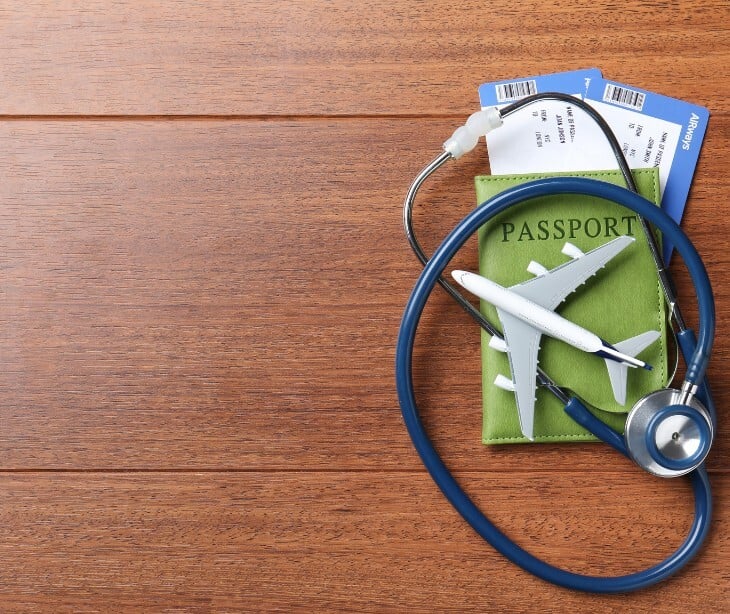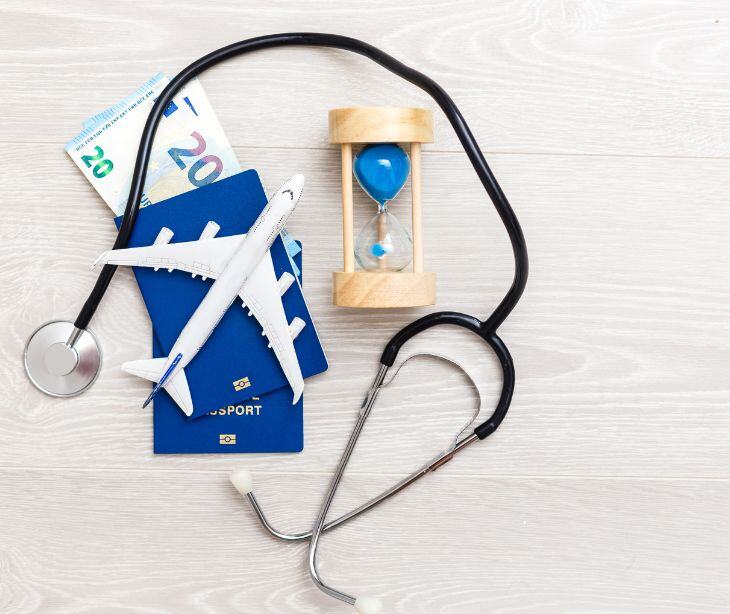
Medical tourism—the practice of traveling abroad for healthcare services—has grown in the past two decades. Driven by factors like cost savings, access to treatments unavailable in one's home country, and reduced wait times, this global industry now represents billions of dollars annually. According to the CDC Yellow Book: Health Information for International Travel, "Medical tourism is a worldwide, multibillion-dollar market that continues to grow with the rising globalization of healthcare. Surveillance data indicate that millions of U.S. residents travel internationally for medical care each year."
It further states that "medical tourists from the United States most commonly travel to Mexico, Canada, the Caribbean, and several countries in South America." As more Americans join the ranks of medical tourists, navigating international healthcare regulations becomes important, particularly regarding patient privacy and data protection.
As the American Medical Association (AMA) explains in its Ethical and Judicial Affairs Report, patients seek care abroad to "address what they deem to be unmet personal medical needs, prompted by issues of cost, timely access to services, higher quality of care or perceived superior services, or to access services that are not available in their country of residence."
The Health Insurance Portability and Accountability Act (HIPAA) remains a critical piece of healthcare legislation in the United States. While primarily designed to operate within domestic borders, its impact extends beyond, creating complex considerations for American patients seeking care abroad and for international providers seeking to attract American clientele.
Understanding HIPAA's core principles
Enacted in 1996, HIPAA has several components, but its Privacy Rule and Security Rule most directly affect medical tourism:
- The Privacy Rule establishes national standards for protecting individually identifiable health information, known as Protected Health Information (PHI).
- The Security Rule sets standards for protecting electronic PHI (ePHI) that is created, received, used, or maintained by covered entities.
As explained in the Medical Tourism Magazine article Legal Issues Traveling with Privacy Protection, "HIPAA protects health information that is 'individually identifiable' or that can be tied to the subject of the information. For example, 'a positive glaucoma test' is not information that is protected by HIPAA, but 'Jane Doe's positive glaucoma test' is protected."
The article further clarifies the scope of HIPAA: "It is important to note that individually identifiable health information is only protected by HIPAA when it is in the hands of certain persons or entities: health care providers, health plans or health care clearinghouses who engage in certain electronic transactions (such as billing). These entities are called 'covered entities.' If individually identifiable information is not in the hands of a covered entity, it is not subject to HIPAA protection."
Together, these rules create a framework designed to protect patient information while allowing the necessary flow of information needed to provide high-quality healthcare. This framework requires covered entities (healthcare providers, health plans, and healthcare clearinghouses) and their business associates to implement specific safeguards and provides patients with rights regarding their health information.
The jurisdictional limitations of HIPAA
An aspect of HIPAA in relation to medical tourism is its jurisdictional scope. HIPAA regulations apply to covered entities operating within the United States and their business associates, regardless of location. However, foreign healthcare providers who have no connection to the U.S. healthcare system are generally not bound by HIPAA regulations.
This creates a challenge for American patients: when they travel abroad for medical care, their health information may no longer be protected by the familiar HIPAA framework. Instead, their data becomes subject to the privacy laws of the country where they receive treatment—laws that may provide more, less, or simply different protections than those available in the United States.
As the Medical Tourism Magazine article states: "HIPAA does not apply to medical information that is obtained outside of the United States."
The CDC Yellow Book highlights, "Local standards for facility accreditation and healthcare professional certification vary and might not be the same as those in the United States. Some facilities and healthcare professionals abroad might lack accreditation or certification. In some locations, tracking patient outcome data and maintaining formal medical record privacy or security policies are not standard practices."
HIPAA considerations for medical tourists
1. Transfer of medical records
When a patient decides to pursue medical tourism, their medical records typically need to be transferred from their U.S. healthcare provider to the foreign facility. This initial transfer remains covered by HIPAA regulations, requiring proper authorization from the patient and secure transmission methods.
However, once these records reach the foreign provider, HIPAA protections may cease to apply. This creates a potential privacy gap that patients should be aware of before proceeding with treatment abroad.
The CDC emphasizes the importance of maintaining proper documentation: "Remind medical tourists to request copies of their overseas medical records in English and to provide this information to any healthcare professionals they see subsequently for follow-up".
As noted in the Medical Tourism Magazine: "However, someone who needs medical care in the United States from someone who is not his or her usual medical provider may find that HIPAA may adversely impact the sharing of medical information unless it is clear that the subject of that information has clearly authorized its disclosure."
The same principle applies when returning to the U.S. with medical records from abroad—clear authorization is essential for information sharing.
The AMA policy on medical tourism specifically notes, "Transfer of medical records to and from facilities outside the U.S. should adhere to HIPAA requirements." This shows the importance of maintaining privacy standards even when care crosses international borders.
2. Varying privacy standards across destinations
Medical tourism destinations vary widely in their approach to healthcare privacy. Some countries have adopted data protection frameworks that match or exceed HIPAA's protections, while others have minimal safeguards.
Popular medical tourism destinations with privacy protections include:
- European Union nations, which operate under the General Data Protection Regulation (GDPR), a framework often considered more stringent than HIPAA
- Canada, with its Personal Information Protection and Electronic Documents Act (PIPEDA)
- South Korea, which has implemented the Personal Information Protection Act (PIPA)
The Medical Tourism Magazine article highlights, "The way in which a person's individual health information will be treated if a traveler is hospitalized or seeks medical attention outside of the United States can vary greatly depending on where the medical care is provided... Depending on where patients are coming from and where they are going, privacy law could be far more stringent or virtually non-existent compared to the protections of their home country."
Conversely, some countries with growing medical tourism industries have less developed privacy frameworks, potentially leaving patient data vulnerable.
3. Continuity of care challenges
When patients return to the United States after receiving treatment abroad, the continuity of their medical care may be affected by HIPAA considerations. Foreign providers sending follow-up information to U.S. healthcare providers must navigate regulatory requirements, potentially leading to delays or communication challenges.
U.S. healthcare providers receiving records from foreign entities face their own set of challenges, including verifying the accuracy and completeness of information not collected under HIPAA standards and integrating this data into HIPAA compliant systems.
The AMA report highlights these challenges, noting, "Medical tourism can leave home country physicians in problematic positions: Faced with the reality that medical tourists often need follow-up when they return, even if only to monitor the course of an uneventful recovery; confronted with the fact that returning medical tourists often don't have records of the procedures they underwent and the medications they received, or contact information for the foreign health care professionals who provided services."
Solutions for navigating HIPAA in medical tourism
Given the challenges presented by HIPAA's jurisdictional limitations in medical tourism, patients and healthcare providers can implement several solutions to better protect health information:
1. Creating personal health records
Patients planning medical tourism trips can develop personal health records (PHRs) that they maintain independently. These records can:
- Be stored on encrypted, password-protected devices
- Include only essential medical information needed for treatment
- Remain under the patient's direct control throughout the medical tourism journey
- Serve as the primary information source for foreign providers, reducing dependence on HIPAA-protected transfers
2. Establishing data exchange agreements
U.S. healthcare providers with patients frequently traveling for medical care can establish formal data exchange agreements with popular foreign facilities. These agreements can:
- Define specific privacy and security standards for handling American patient information
- Outline processes for secure transmission of information between providers
- Establish protocols for handling potential data breaches
- Create standardized formats for medical documentation to improve interoperability
3. Utilizing encryption technologies
Both patients and providers can leverage modern encryption technologies to protect health information during the medical tourism process:
- End-to-end encrypted messaging platforms for communications between providers
- Encrypted email services for transmitting medical records
- Patient-controlled encryption keys for accessing digital records
- Blockchain-based medical record systems that maintain immutable audit trails
Related: HIPAA compliant email
4. Developing medical tourism-specific consent forms
Healthcare providers can develop specialized informed consent documents for medical tourists that specifically address privacy considerations, including:
- Explicit authorization for information transfer to specific foreign providers
- Acknowledgment of different privacy standards in destination countries
- Permission for return transfer of treatment records back to U.S. providers
- Clear explanation of which entities will have access to patient information
FAQs
What is the main purpose of HIPAA?
HIPAA is primarily designed to protect the privacy and security of individuals' health information in the United States.
Does HIPAA apply to all healthcare providers worldwide?
No, HIPAA only applies to U.S.-based covered entities and their business associates.
How does HIPAA define "Protected Health Information" (PHI)?
PHI is any individually identifiable health information that is created, received, stored, or transmitted by covered entities.
Are international healthcare providers required to follow HIPAA?
Generally, no, unless they are business associates of U.S.-based covered entities.
What happens to my health information when I receive care abroad?
Your data may be subject to the privacy laws of the country where you receive treatment, which might differ significantly from HIPAA.
Subscribe to Paubox Weekly
Every Friday we bring you the most important news from Paubox. Our aim is to make you smarter, faster.




